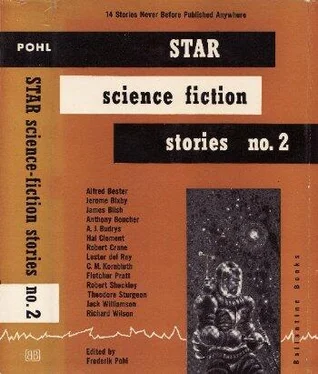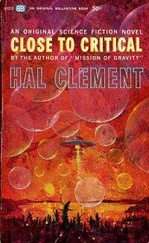Hal Clement - Critical Factor
Здесь есть возможность читать онлайн «Hal Clement - Critical Factor» весь текст электронной книги совершенно бесплатно (целиком полную версию без сокращений). В некоторых случаях можно слушать аудио, скачать через торрент в формате fb2 и присутствует краткое содержание. Год выпуска: 1953, Издательство: Ballantine Books, Жанр: Фантастика и фэнтези, на английском языке. Описание произведения, (предисловие) а так же отзывы посетителей доступны на портале библиотеки ЛибКат.
- Название:Critical Factor
- Автор:
- Издательство:Ballantine Books
- Жанр:
- Год:1953
- ISBN:нет данных
- Рейтинг книги:4 / 5. Голосов: 1
-
Избранное:Добавить в избранное
- Отзывы:
-
Ваша оценка:
- 80
- 1
- 2
- 3
- 4
- 5
Critical Factor: краткое содержание, описание и аннотация
Предлагаем к чтению аннотацию, описание, краткое содержание или предисловие (зависит от того, что написал сам автор книги «Critical Factor»). Если вы не нашли необходимую информацию о книге — напишите в комментариях, мы постараемся отыскать её.
Critical Factor — читать онлайн бесплатно полную книгу (весь текст) целиком
Ниже представлен текст книги, разбитый по страницам. Система сохранения места последней прочитанной страницы, позволяет с удобством читать онлайн бесплатно книгу «Critical Factor», без необходимости каждый раз заново искать на чём Вы остановились. Поставьте закладку, и сможете в любой момент перейти на страницу, на которой закончили чтение.
Интервал:
Закладка:
Critical Factor
by Hal Clement
Pentong, excited for the first time in his life, raced northward. There was no need to grope or feel his way; this close to the great earthquake zone there were always minor tremors, and their echoes from the dense basalt below and the emptiness above reached him almost constantly. The treacherous sandstone strata, which beguiled the lazy traveler with the ease of penetration they offered and then led him up to the zones of death, were easy to spot; Pentong actually used them now, for seeing was so good that he could leave them with plenty of time to seek the safer levels below whenever they started to slope.
The worst of his journey was behind. The narrow bridge of livable rock which led to the strange land he had found had been recrossed in safety, in spite of the terrifying and deceptive manner in which temblors from the earthquake zone far to the north were trapped, magnified, and echoed from its sides. Now he could see for many days’ travel all about him, and as far as he could see the land was good.
Not as good as that he had visited, of course. This was the land he had known all his life, where food was just hard enough to find to make life interesting; where for ages past counting other, less fortunate, races from the far, far north had sought to break in and kill that they might inherit its plenty; where pools of magma shifted just rapidly enough to trap the unwary between impenetrable basalt and glowing death; where, if Pentong was right in what he believed of his discovery, regions now too close to the zones of death might be made accessible and provide food and living space for unguessable generations to come.
He dreamt of this possibility constantly as he moved. No trace of his passage marked the rock behind him, for none of it was edible; but he hardly thought of food for himself. Speed was his prime concern, and to achieve it he traveled as close as he dared to the upper zones.
The nearest settlement was more than five thousand miles north, he knew; his memory held a sharp picture of the tortuous path he had followed from it, and he retraced that path now. It led him far to the east, where the earth tremors were faint and travel slowed by the poor vision; then back, at a much lower level, to the northwest, where the principal delay was the denser rock. Five hundred miles short of his goal he had to stop, to examine carefully the region of magma pools through which he had passed on his way south. The precise path he had followed could not now be used; it was blocked in several places by molten rock which had forced its way between strata and heated the otherwise habitable stone above and below to an unbearable degree. But other paths existed; and slowly and carefully Pentong wormed his way between the pools, sometimes retreating the way he had come, sometimes going almost straight away from his goal, but gradually working north and downward until the last of the dangerous pockets of fluid lay behind him. Then he could hasten once more; and at last he reached the bed of carbonate rock, a mile thick and more than thirty thousand square miles in area, which had been deposited on the floor of an ancient sea some hundreds of millions of years before and was now safely surrounded and capped by harder layers which shielded its inhabitants from filtering oxygen. This was the city—not the one where Pentong had been born, but the farthest south of all the dwelling centers of his people, and the one to which the more adventurous spirits of the race tended to gravitate. The cities to the northwest and northeast, under the Bering and Icelandic bridges, held danger, of course; they bore the brunt of the endless defense against the savage tribes from beyond the bridges. Still, that danger was known and almost routine; it was the unknown parts of the world that spelled adventure. Pentong, he was sure, had proved himself the most adventurous so far; and he was also sure that he had done more.
“Halt!” The challenge came through the rock as Pentong’s great, liquid body began to filter into the limestone. No city, even this far from the zones of war, dared be without sentries. “Name yourself!”
“I am Pentong, returning from the south, a trip that was commanded. My word is this.” He emitted the coded series of temblors which the City Leaders had given him for identification, when and if he returned.
“Wait.” The explorer knew that the sentry’s body extended far back into the city, and that at his other end he was in communication with the Leaders. The wait was not long. “Enter. You may eat, if you hunger, but go to the Leaders as soon thereafter as may be.”
“I am hungry, but I must go to them at once. I have found something of importance, and they must know.” The sentry was plainly curious, but forebore to question further; obviously if this stranger felt his news too important to wait for food. he would hardly pause for conversation.
“Take the Stratum of Manganese; it will be cleared for you,” was all the watcher said. Pentong acknowledged the courtesy—traffic was sometimes a problem in a city of sixty billion inhabitants, each of whom averaged ten cubic yards in volume and was apt to have that bulk spread through a most irregular outline. The Stratum of Manganese was a foot-thick layer stained with the oxide of that metal, and thereby marked plainly to Pentong’s senses. It was cut off sharply by a fault which extended across the center of the city in a northeast-southwest direction; and at one point along that fault was a large volume where numerous boulders of quartz, probably washed to this spot by some ancient river, were imbedded in the limestone. Here the Leaders, or enough of them to transact business, could always be found. Pentong greeted them, received the acknowledgment, and began his report without preamble.
“About five thousand miles to the south,” he said, “the continental mass in which this city is located narrows apparently to a point. The earthquake zone extends to this point, and seeing is good; but echoes tend to be confusing in some regions, and I explored many of these by touch. In one such area I found a long tongue of sandstone extending yet farther south; and after debating whether I should return to report its existence before venturing out along it, I decided it would be better to have something more complete to report. It was almost like traveling through a stratum which has been cut off on opposite sides by parallel dikes; but the sides this time were simply emptiness. There was no zone of death, however, apparently the tongue of rock is surrounded by what Derrell the Thinker called ocean, which seems to protect the upper regions of portions of the continents. Below, of course, was basalt.
“The neck of rock went on, seemingly without end. Sometimes it widened, sometimes narrowed so that I thought it had come to an end; but it always went on. Those who claim the continents are drifting will have to explain how that narrow ridge of stone has stayed intact.
“At last, however, it really widened; and to make short a report whose data was long in compiling, there is a continent at the other end—and I could find no trace of other than lower animals in that continent. That, however, is not its most important feature; what is really striking is the fact that it appears to have no Zone of Death whatever. It is covered with a solid material, which seems to be crystalline from the way it carries sound, but which is impenetrable to living bodies. The continent is inhabitable from top to bottom.”
“How about edible rock?”
“As good or better than our own land.” The Leaders reacted audibly to this, and it was some time before speech was again directed at the explorer. Then, as he had expected, it was complimentary.
“Pentong, you deserve the thanks of every inhabitant of this continent. If your report is as accurate as it seems to be objective, our food problem is solved for generations to come. We will transmit this news to the other cities, and plans for colonizing the new continent will be worked out as rapidly as may be. Your name will be known from here to the Northern Frontier.”
Читать дальшеИнтервал:
Закладка:
Похожие книги на «Critical Factor»
Представляем Вашему вниманию похожие книги на «Critical Factor» списком для выбора. Мы отобрали схожую по названию и смыслу литературу в надежде предоставить читателям больше вариантов отыскать новые, интересные, ещё непрочитанные произведения.
Обсуждение, отзывы о книге «Critical Factor» и просто собственные мнения читателей. Оставьте ваши комментарии, напишите, что Вы думаете о произведении, его смысле или главных героях. Укажите что конкретно понравилось, а что нет, и почему Вы так считаете.












